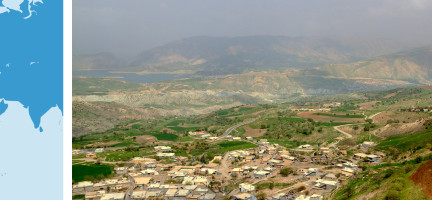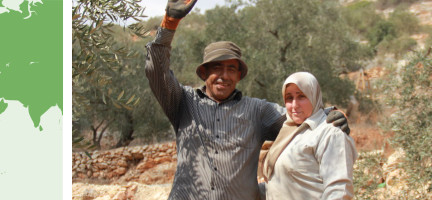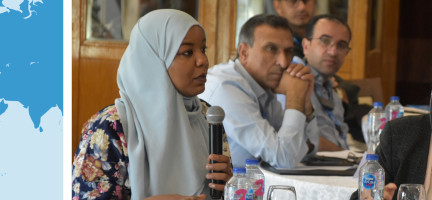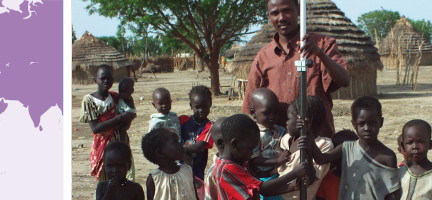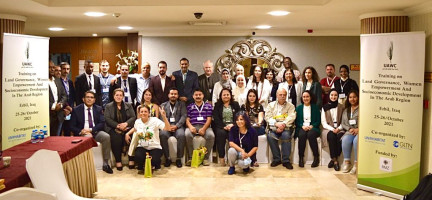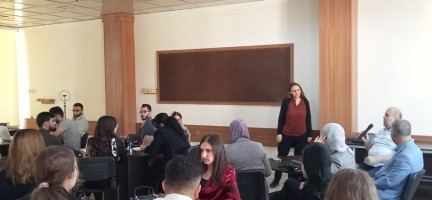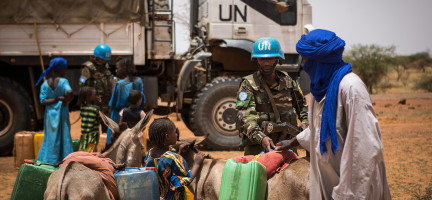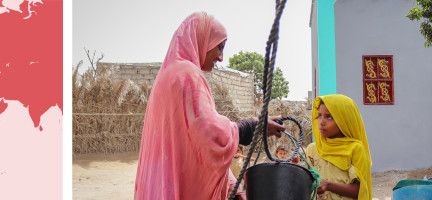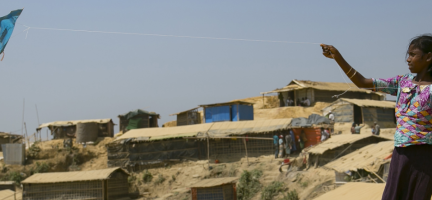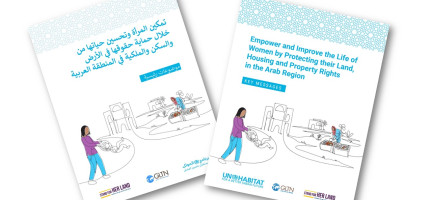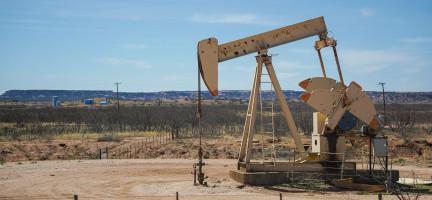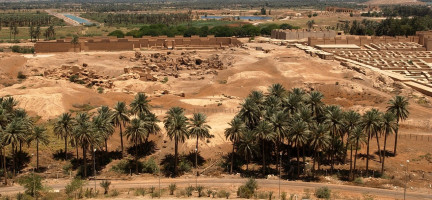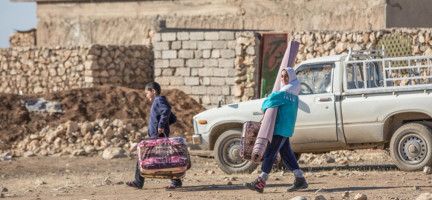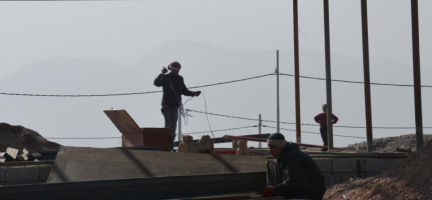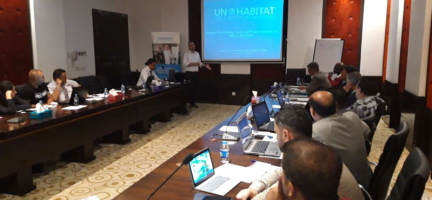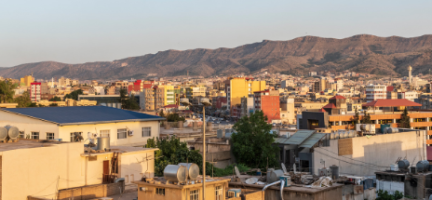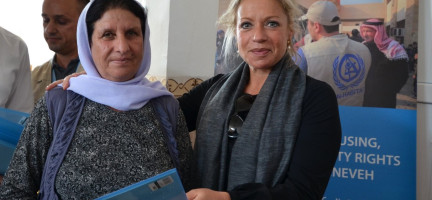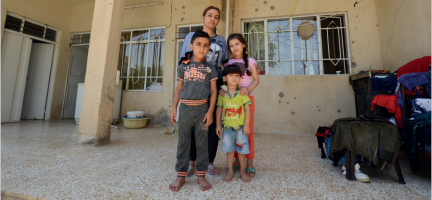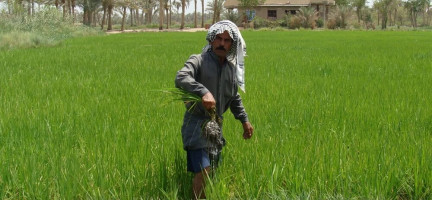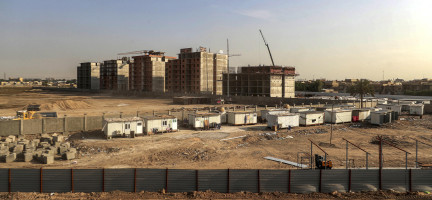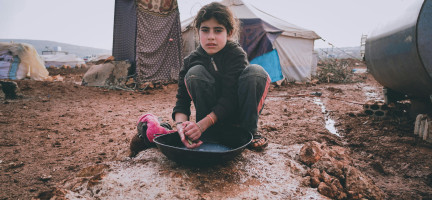Irak
L'Irak est l'un des pays les plus orientaux de la région arabe. Il est bordé au nord par la Turquie, à l’est par l’Iran, à l’ouest par la Syrie et la Jordanie et au sud par l’Arabie saoudite et le Koweït.
L’Irak a une histoire unique en tant que « puissant moteur de croissance économique et commerciale régionale, et phare mondial de la culture et de l’apprentissage » (Bilan commun de pays 2009). Au cours des dernières décennies, il a enduré deux guerres successives du Golfe, des sanctions économiques, une intervention militaire et des conflits internes. L'instabilité politique, la nature centralisée des mécanismes de gouvernance, une allocation déséquilibrée des ressources et un manque d'investissement dans les infrastructures, l'environnement et les services sociaux ont eu un impact sur la capacité du pays à développer son économie et à répondre aux besoins de la population (Leçons apprises des Nations Unies pour le développement Évaluation 2011). Les systèmes fonciers actuels en Irak sont fortement influencés par l’insécurité sociale et politique et par les multiples vagues de déplacements forcés au cours des dernières années, qui ont contribué à l’insécurité foncière et aux conflits liés à l’utilisation des terres.
Régime foncier
En Irak, les administrations foncières ont des fondements historiques profonds, mais les systèmes actuels d’enregistrement et d’enregistrement des terres sont fortement influencés par des politiques et des idéologies contradictoires qui contrôlent leurs programmes et leurs réformes. L’administration foncière irakienne, tant dans les secteurs ruraux qu’urbains, était sous l’influence massive des politiques et idéologies contradictoires de l’État irakien et même du régime religieux qui contrôlait ses programmes et ses réformes (Al Rashid, 2005 ; ONU-Habitat, 2010b). Ces mêmes facteurs (faible gouvernance) ont finalement causé une légitimité sociale et une insécurité juridique pour les administrations foncières (rapport ONU-Habitat, 2012 ; Shaikley, 2013). L’enregistrement foncier et les droits de propriété en Irak ont des fondements historiques profonds qui remontent à la période Hammourabique. Cependant, le système actuel d’enregistrement foncier doit davantage aux 400 ans d’occupation ottomane de l’Irak et à l’intervalle sous mandat britannique qui a suivi (USAID, 2005).
La valeur du terrain
La valeur du terrain est basée sur la spéculation du marché. Il n’existe pas d’approche institutionnelle de l’évaluation des terres ni de mécanisme institutionnel pour définir les terres ; ils s’appuient principalement sur d’anciennes lois. Le système d'administration foncière reste un système centralisé. L'enregistrement foncier est administré localement, mais les avantages de cet enregistrement ne sont pas réalisés au niveau local. Tous les cinq ans, l'administration fiscale publie une brochure comprenant une estimation de la valeur des terrains pour différentes utilisations (résidentielle, industrielle, commerciale).
Développement agraire
De nombreux gouvernorats d'Irak ont été gravement endommagés par les conflits. En réponse à cela, le MoP irakien a lancé le plan de reconstruction et de développement des villes irakiennes endommagées (2018 – 2022) doté d’un budget de 100 milliards de dollars (ONU-Habitat, 2018).
L'utilisation des terres
La participation des citoyens aux questions locales d'utilisation des terres est limitée et l'enregistrement foncier ne génère pas de revenus locaux via l'impôt foncier. Les décisions en matière d’aménagement du territoire ne sont pas adéquates et ne sont pas appliquées. Compte tenu du système d’enregistrement foncier actuel, il est possible que la décentralisation puisse permettre la génération de revenus locaux et le contrôle citoyen de l’utilisation des terres (USAID Iraq Local Governance Programme Land Registration and Property Rights in Iraq, janvier 2005). Les principaux défis auxquels est confrontée la gestion de l'utilisation des terres sont liés au manque de documentation et aux plans obsolètes, en particulier dans les zones rurales. L’absence de mécanismes étatiques pour contrôler et appliquer les décisions d’utilisation des terres est le résultat de la situation sociale et politique incertaine des dernières décennies.
Règlement des litiges fonciers
Il n’existe pas de données complètes sur les conflits fonciers en Irak et le ministère de la Justice irakien ne produit pas de statistiques publiques par type de cas, ce qui rend impossible la cartographie de la fréquence et des types de conflits fonciers en Irak. Le droit tribal joue un rôle très important dans la gestion des questions foncières et immobilières, y compris dans le règlement des différends.
Focus spécial : Sauvegarder les preuves des droits au logement, à la terre et à la propriété des réfugiés syriens
Depuis 2020, ONU-Habitat et le Global Land Tool Network, en partenariat avec la GIZ, travaillent au Liban et en Irak pour améliorer la sécurité foncière et sauvegarder les droits au logement, à la terre et à la propriété des réfugiés syriens déplacés.
À l'aide d'un outil d'enregistrement des terres et des propriétés et grâce à un processus de recensement participatif et volontaire rigoureux, l'intervention documente les revendications des réfugiés syriens sur leurs propriétés résidentielles et non résidentielles en Syrie. Les revendications documentées incluent la pleine propriété, la copropriété et les droits d'utilisation à long et à court terme. Un large éventail de types de preuves légalement reconnus et supplémentaires sont acceptés et protégés, ainsi que les documents personnels à l’appui. La vérification des droits au logement, à la terre et à la propriété revendiqués par le demandeur n'est pas entreprise, mais les informations collectées sont stockées en toute sécurité dans des unités de données dédiées d'ONU-Habitat.
Dans le cadre du projet, des « Certificats de collecte et de sauvegarde des documents relatifs aux relations foncières » sont délivrés par ONU-Habitat. Les certificats ne constituent pas une preuve de propriété mais témoignent de la procédure régulière adoptée par laquelle le demandeur a soumis sa réclamation sur les propriétés décrites dans le certificat et les preuves à l'appui associées. Les certificats sont remis gratuitement aux demandeurs et peuvent être utilisés par les bénéficiaires pour récupérer des informations sur leurs propriétés et les pièces justificatives jointes.
Ce projet est conçu pour soutenir les efforts futurs visant à reprendre possession des propriétés illégalement occupées, négociées ou détruites ou à réclamer une indemnisation. La participation au projet n'a aucune conséquence sur le statut des bénéficiaires dans le pays ou leur résidence ni sur leur retour en Syrie. En lire plus à propos de ce projet
Intervention clé
La collaboration fructueuse entre le programme Irak d'ONU-Habitat et le Global Land Tool Network a permis d'améliorer les connaissances sur les pratiques foncières dans les zones urbaines avec le gouvernement, la société civile et les acteurs internationaux, reconnaissant une approche de « continuum de droits » pour les pauvres urbains.
Dans le cadre du projet « Soutien au logement, aux droits fonciers et à la propriété des personnes déplacées à Ninive », ONU-Habitat Iraq, en partenariat avec Global Land Tool Network, a dispensé une formation sur les bases de données d'administration et de gestion foncière à ses homologues locaux sur le modèle de domaine de régime social et un soutien juridique. et des conseils sur les questions foncières et liées aux conflits.
En outre, dans le cadre du projet « Droits au logement, à la terre et à la propriété des Yézidis dans le district de Sinjar, en Irak », GLTN a travaillé en étroite collaboration avec le bureau national d'ONU-Habitat en Irak pour faciliter le retour durable de la communauté yézidie dans son foyer d'origine et dans le reconnaissance de leurs droits de propriété.
Land dispute resolution
There is no comprehensive data on land disputes in Iraq and the Ministry of Justice does not produce public statistics by case type which makes it impossible to map the frequency and types of land disputes. The inaccessibility of the land information system (LIS) is problematic, particularly now when there is a great need to locate property and other identity documents within the government system and generate copies for claims purposes. This is made difficult by the centralized LIS in Baghdad. However, land disputes are mostly linked to displacement, dispute over tenure rights, and weak land governance. Some of these disputes can lead to violent conflicts, especially when there’s weak rule of law, others lead to land tenure insecurity and constrained use of land.
The Civil Code contains protections against coercion, fraud and deceit. Transfers of property made under such conditions are invalid, and any property sale outside the registry is considered null and void. Concerning land dispute resolution mechanisms, land disputes arising from land sale contracts, adverse possession, real estate renting, and property claims are regulated through the judicial system, including property claims arising out of the displacement of population after April 2003. The Civil Code deals with matters concerning inheritance rights and disputes related to religious law.
Alternative dispute resolution mechanisms
Recourse to alternative dispute resolution mechanisms (ADR) to resolve disputes including land disputes is not well developed in Iraq. Conversely, the role of tribal law is seen by Iraqi authorities as a viable alternative in managing land and property issues, including dispute resolution. Iraq’s history of fusing different forms of law is a clear advantage now where the State has limited reach in certain areas. In general, people prefer traditional (tribal) rather than formal systems of arbitration because of the high costs and slowness of the formal system. If disputes cannot be resolved in traditional ways, the concerned parties then resort to the modern court system. It would be worthwhile to explore the different ADR approaches already used by tribes and lineages that can be connected to statutory law in mutually supportive ways. This is important given that tribal disputes resolution mechanisms will be present in areas of return for IDPs[23]. The ADR needs to be incorporated more efficiently into the dispute resolution system[24].
Focus: Safeguarding evidence of housing, land and property rights of Syrian refugees
Since 2020, UN-Habitat and the Global Land Tool Network in partnership with GIZ have been working in Lebanon and Iraq to improve the land tenure security and safeguard the housing, land and property rights of Syrian refugees therein displaced.
Using a land and property recordation tool and through a rigorous participatory and voluntary enumeration process, the intervention documents Syrian refugees’ claims to their residential and non-residential properties in Syria. The claims documented include full ownership, joint ownership, long- and short-term use rights. A wide range of legally recognized and additional types of evidence are accepted and safeguarded, as well as supporting personal documentation. Verification of the housing, land and property rights claimed by the claimant is not undertaken, but the information collected is safely stored in dedicated data units of UN-Habitat.
As part of the project, ‘Certificates of Collection and Safeguarding of Tenure Relationship Documents’ are issued by UN-Habitat. The certificates are not proof of ownership but testify the adopted due process through which the claimant submitted his/her claim to the properties described in the certificate and the related supporting evidence. Certificates are handed over to the claimants at no fee and can be used by the beneficiaries to retrieve information about their properties and the supporting evidence enclosed.
This project is designed to support future efforts to re-possess properties illegally occupied, transacted or destroyed or to claim compensation. The participation in the project does not have any consequence on the beneficiaries’ status in the country or residence nor to their return to Syria.
Safeguarding evidence of housing, land and property rights of Syrian refugees
Since 2020, UN-Habitat and the Global Land Tool Network in partnership with GIZ have been working in Lebanon and Iraq to improve the land tenure security and safeguard the housing, land and property rights of Syrian refugees therein displaced.
Refugees are informed about the scope of the project and about how data is collected, handled and stored in accordance with the data protection protocol developed for this project. Refugees can opt out of the process at any time during the enumeration.
The claims documented include full ownership, joint ownership, long- and short-term use rights. A wide range of legally recognized and additional types of evidence are accepted and safeguarded, as well as supporting personal documentation. The information collected is safely stored in dedicated data units of UN-Habitat, accessible to authorized personnel only. Changes taking place after the date of claim registration are not recorded.
Verification of the housing, land and property rights claimed by the claimant is not undertaken. There is no adjudication of the ownership of the properties included in the enumeration, nor property documents are issued as a result of this project.
As part of the project, ‘Certificates of Collection and Safeguarding of Tenure Relationship Documents’ are issued by UN-Habitat. The certificates are not a proof of ownership but testify the adopted due process through which the claimant submitted his/her claim to the properties described in the certificate and the related supporting evidence. Certificates are handed over to the claimants at no fee and can be used by the beneficiaries to retrieve information about their properties and the supporting evidence enclosed.
This project is designed to support future efforts to re-possess properties illegally occupied, transacted or destroyed or to claim compensation. The participation in the project does not have any consequence on the beneficiaries’ status in the country or residence nor to their return to Syria.
How are certificates issued? STEP 1: Field Interviews Enumerators from UN-Habitat or its implementing partners conduct interviews with Syrian refugees currently displaced in Lebanon and Iraq and fill in the questionnaire using mobile tablets. The interviews are carried out through a voluntary and participatory process: refugees are informed about the scope of the project and about how data is collected, handled and stored in accordance with the data protection protocol developed for the project. The full data protection protocol is available for viewing to beneficiaries upon their request. The respondents can choose not to proceed with the enumeration at any point of the data collection process. The data collected include a wide range of tenure rights and supporting documents. In Iraq, enumerators conduct the data collection through door-to-door interviews. In Lebanon, Syrian refugees are invited to submit their claim at the community centres established by UN-Habitat for this project. For more information on the location of these community centres please refer to the contact information provided below. STEP2: Data archiving Digital copies of the information and evidence collected during the interviews are stored with UN-Habitat which is the data custodian for this project. Changes taking place after the date of claim registration are not recorded and a verification of the housing, land and property rights claimed by the claimants is not undertaken. STEP 3: Issuing the certificates Certificates of Collection and Safeguarding of Tenure Relationship Documents are issued and signed by UN-Habitat. Certificates testify the adopted due process through which the claimant documented his/her claim to the tenure relationship described in the document and the provision of supporting evidence. The certificates are not a proof of ownership. They are designed to help the claimant and his/her household to safely store his/her housing, land and property claims and supporting evidence in case of loss of these documents. STEP 4: Delivery of certificates Enumerators from UN-Habitat or its implementing partners hand over the certificates to the claimants at no fee through door-to-door visits, at the established UN-Habitat community centres, or in batches during specifically organized events. For more information on the location of UN-Habitat community centres in Lebanon and Iraq please refer to the contact information provided below. Know your rights The project team adopts a rigorous do-no-harm approach and ensures an inclusive and transparent process from the beginning of the project until the last phase. Any willing member of the identified communities can record his/her housing, land and property rights and claims to their properties in Syria – either individually, or as member of a household. The respondent can choose not to proceed with the process at any point of the data collection process. Concerns can be raised at any point with the field team. The Data Protection Protocol, which details the rights of the respondents, and the way data is collected and managed, is presented to the respondents before the start of the enumeration and it is available to be consulted upon request by requesting it from the field team. About UN-Habitat UN-Habitat is the agency of the United Nations working towards sustainable urbanization. It promotes socially and environmentally sustainable human settlements and adequate shelter for all. UN-Habitat has extensive country presence in the Arab states. Its country offices are located in Morocco, Tunisia, Egypt, Sudan, Lebanon, Palestine, Jordan, Iraq, Syria, Yemen, Kuwait and Saudi Arabia. For more information about UN-Habitat, please visit: www.unhabitat.org. The Global Land Tool Network (GLTN), hosted by UN-Habitat, is an alliance of international organizations committed to increasing access to land and tenure security for all, with special focus on the most vulnerable. GLTN works in close collaboration with UN-Habitat regional and country offices on themes related to land governance; land administration; housing, land and property rights; and land policy reforms. For more information about the Global Land Tool Network, please visit: www.gltn.net. At the regional level, UN-Habitat and GLTN manage the Arab Land Initiative, which focuses on improving good land governance and tenure security in the Arab region. For more information, visit https://arabstates.gltn.net/ |
To know more:
Brochure on Housing, Land and Property Rights for Syrian Refugees in Iraq
Or contact UN-Habitat Iraq: Website: www.unhabitat.org/iraq Email: info.iraq@unhabitat.org
Key interventions
The successful collaboration between UN-Habitat’s Iraq Programme and Global Land Tool Network (GLTN) has created improved knowledge on tenure practices in urban areas with the Government, civil society and international actors, recognizing a “continuum of rights” approach for the urban poor.
Under the project “Support to Housing, Land and Property Rights for IDPs in Nineveh,” UN-Habitat Iraq, in partnership with GLTN, provided training on land administration and management databases to local counterparts on the Social Tenure Domain Model (STDM) and legal support and advice on land- and conflict-related issues.
Further, under the “Housing, Land and Property Rights of Yazidis in Sinjar District, Iraq” project, UN-Habitat, with support from GLTN, facilitated the sustainable return of the Yazidi community to their original home and the recognition of their property rights through the implementation of a fit-for-purpose and a community-based approach land tool, the STDM.
On 27 December 2022, the Iraq government, under the leadership of its Prime Minister, Mr. Mohammed S. Al-Sudani, issued a decree to officially recognize the land ownership rights of the Yazidi communities, recognizing the occupancy records issued by UN-Habitat as full property titles.
UN-Habitat is currently working with partners on the modernization of the land and property registry and the accompanying legal and administrative review of the land sector.
Clause de non-responsabilité
Les informations contenues dans cette page sont basées sur l'ensemble des connaissances développées par ONU-Habitat, GLTN et les partenaires de l’Initiative Arabe sur le Foncier. Les désignations utilisées et la présentation du matériel n'impliquent l'expression d'aucune opinion de la part du Secrétariat des Nations Unies concernant le statut juridique de tout pays, territoire, ville ou zone, ou de ses autorités, ou concernant la délimitation. de ses frontières ou limites, ou concernant son système économique ou son degré de développement. Les informations peuvent contenir des inexactitudes en raison de la ou des sources de données et ne reflètent pas nécessairement les points de vue d'ONU-Habitat ou de ses organes directeurs.
La page de l'Irak est encore en construction. Partagez avec nous toute information, ressource ou correction pertinente pour enrichir notre bibliothèque. Contactez l’Initiative Arabe sur le Foncier à unhabitat-arablandinitiative@un.org !
